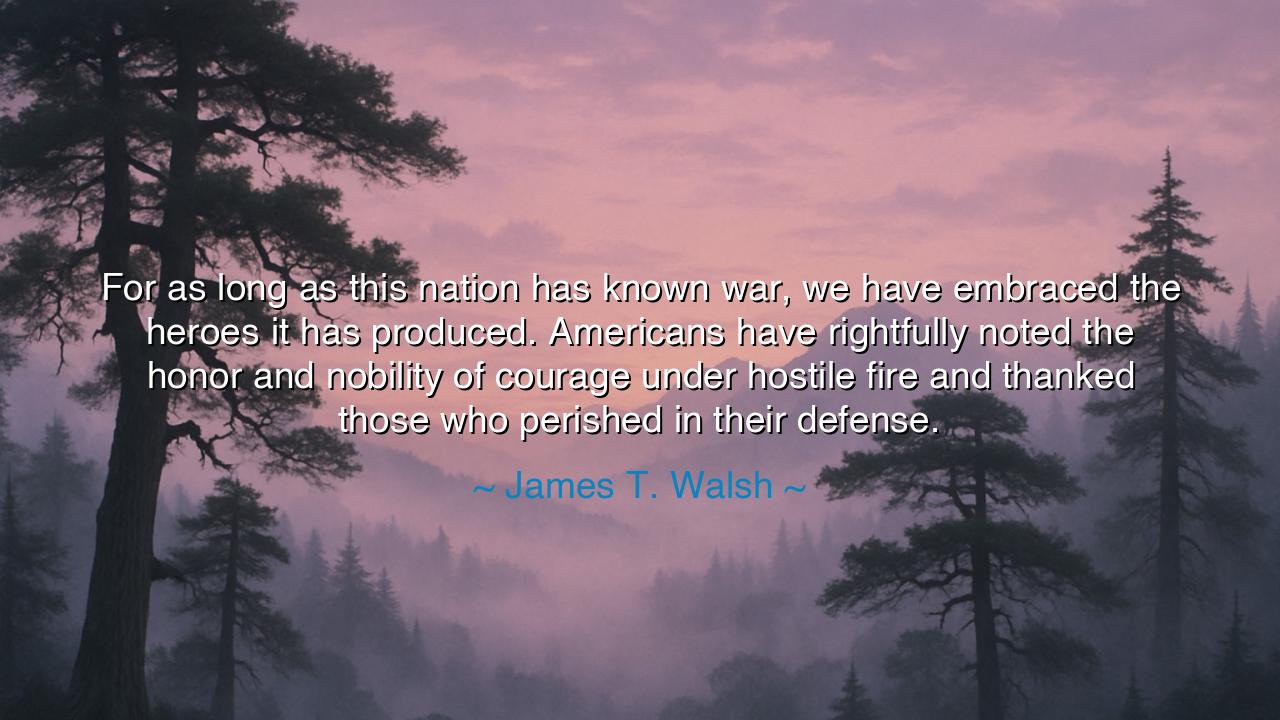
For as long as this nation has known war, we have embraced the
For as long as this nation has known war, we have embraced the heroes it has produced. Americans have rightfully noted the honor and nobility of courage under hostile fire and thanked those who perished in their defense.






The statesman James T. Walsh, in reflecting upon the spirit of his homeland, once said: “For as long as this nation has known war, we have embraced the heroes it has produced. Americans have rightfully noted the honor and nobility of courage under hostile fire and thanked those who perished in their defense.” These words are not merely a tribute to the fallen, but a mirror held to the eternal heart of humanity. For in every age, from the dawn of civilization to the modern world, the honor of courage and the sacrifice of heroes have stood as sacred pillars upon which nations rest. Walsh speaks not of glory in war itself, but of reverence for those who faced death that others might live in peace.
The origin of these words springs from the long tradition of remembrance that defines the American spirit. Born in a land forged by conflict — from revolution to civil strife, from foreign battlefields to the quiet vigilance of peacekeepers — America has known both the cost and the calling of freedom. In every generation, young men and women have risen to stand before the storm, their courage tested not in comfort but in fire. And when the smoke clears and the world breathes again, it is the memory of their valor that binds the living to the fallen, the past to the future. Walsh’s words remind us that to honor them is not to glorify war, but to recognize the nobility of courage under fire — that unyielding human spirit which transforms mortal fear into immortal resolve.
The meaning of courage under hostile fire extends beyond the battlefield. It is the moment when a person, facing the darkness of death, chooses duty over safety, principle over self. In war, such courage shines brightest — yet its essence belongs to all who dare to stand firm in the face of adversity. The soldier who advances through the hail of bullets is kin in spirit to the citizen who defends truth in a time of lies, or the mother who protects her child in peril. Courage, whether on the frontlines of war or in the quiet trials of life, is the light that keeps the world from sinking into despair.
Consider the story of Sergeant Alvin C. York, one of America’s most renowned heroes of the Great War. A man of deep faith and simple origins, he entered the conflict reluctant to kill, believing it against his moral code. Yet, when fate placed him amid a deadly ambush, he acted with clarity of purpose, capturing 132 enemy soldiers and turning the tide of battle. York’s heroism was not born of bloodlust or pride — it was born of duty, of the conviction that the lives of his comrades and the safety of his nation outweighed his fear. He embodied what Walsh calls nobility of courage: the ability to act righteously when the world demands it most, even when the heart trembles.
And yet, the true greatness of a people lies not only in the valor of its warriors, but in its gratitude. Walsh’s words remind us that America has always embraced its heroes — not with idle praise, but with remembrance. Monuments rise where soldiers fell, flags are lowered in mourning, and the living speak their names so they are not lost to time. Such remembrance is not mere ceremony; it is the sacred act of acknowledging that every freedom enjoyed today was purchased by sacrifice. In this way, the living fulfill their debt to the dead — by carrying forward the values for which they gave their lives.
Throughout history, nations have been measured by how they honor their defenders. In ancient Greece, the fallen of Thermopylae were remembered with these words: “Go tell the Spartans, stranger passing by, that here obedient to their laws we lie.” In those words, as in Walsh’s, we find the same eternal truth — that the courage of those who die for duty transcends the brief span of their lives. It becomes the moral foundation of their people. Their bravery does not glorify conflict, but sanctifies peace.
Let every listener, then, take this teaching to heart: honor the courageous, live worthy of their sacrifice, and uphold the peace they died to secure. To remember them is not enough — one must act in their spirit, defending justice, truth, and compassion in all things. The greatest tribute to a hero is not a statue or a speech, but a life lived with the same courage they once showed in battle.
Thus, as James T. Walsh teaches, a nation endures not by the strength of its armies, but by the strength of its gratitude. The heroes under fire, those who perished and those who returned, form the living soul of democracy — proof that freedom, though fragile, is worth every sacrifice. And so, may every generation remember: to thank the brave is to renew the promise of liberty, to embrace their legacy is to honor humanity itself, and to live with courage is to continue the noble work they began.






AAdministratorAdministrator
Welcome, honored guests. Please leave a comment, we will respond soon